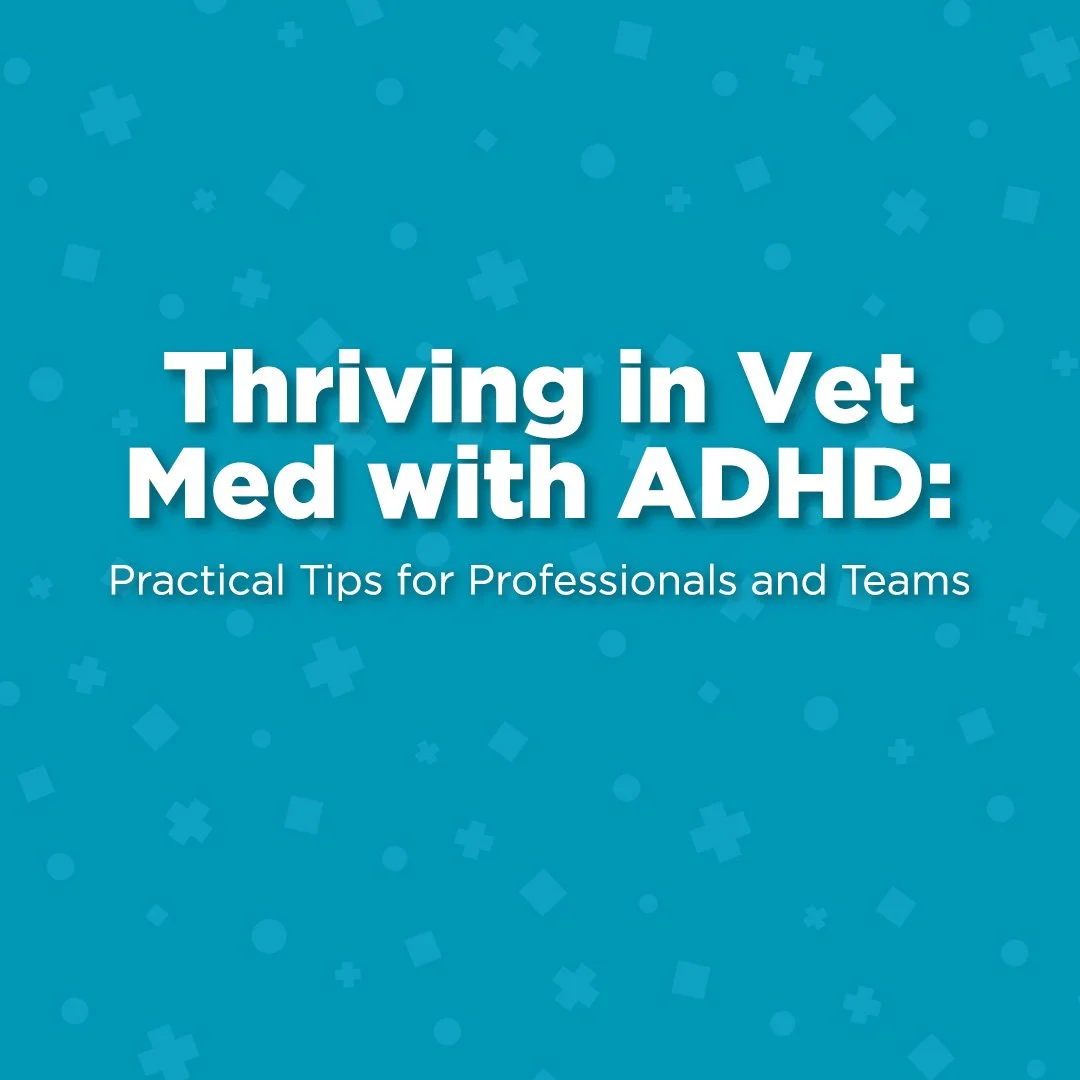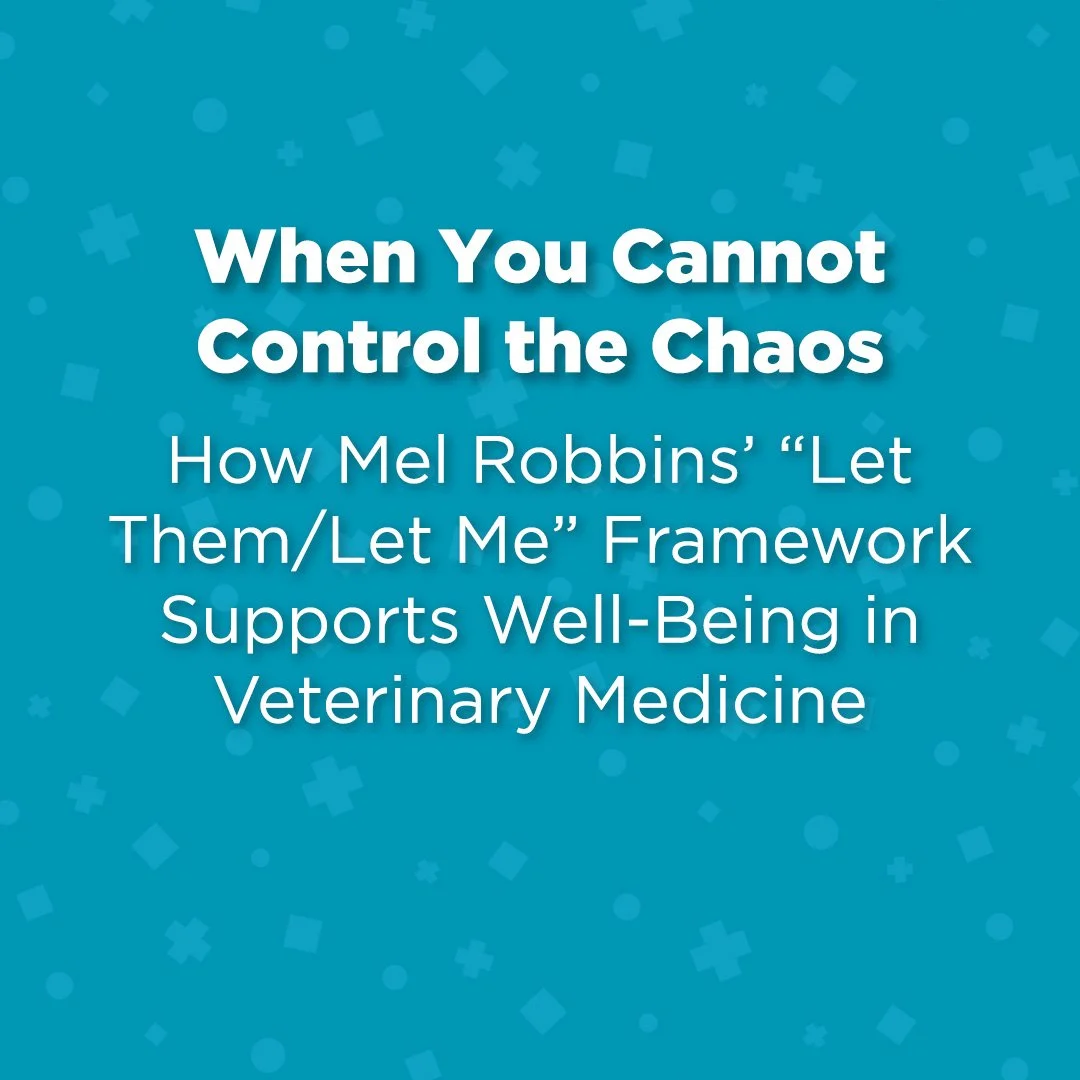
Articles
Thriving in Veterinary Medicine with ADHD
Veterinary medicine is demanding, fast-paced, and emotionally intense - conditions that can amplify both the strengths and challenges of ADHD. Recent research shows that ADHD is not only common in the field but also deeply intertwined with how veterinary professionals work, learn, and communicate.
When You Cannot Control the Chaos
Veterinary medicine is demanding work. You are constantly navigating client emotions, high-stakes medical decisions, moral stress, online criticism, time pressure, and the ongoing strain of being both a clinician and an emotional support provider. One of the most exhausting parts of the job is the pressure to manage not only your responsibilities, but everyone else’s reactions to them. In recent years, author and speaker Mel Robbins introduced a simple but powerful mindset tool known as the “Let Them Theory.” It gained widespread attention because it addresses a core human struggle: we spend enormous energy trying to influence, control, or fix what other people think, feel, or do - energy we rarely have to spare.
When “I’m Handling It” Isn’t Enough
You train to run toward crises. That habit can become a barrier when your mind needs care. You witness suffering, push through, compartmentalize. But trauma doesn’t always stop when your shift ends. The very habit of pushing through crises can keep trauma unprocessed and open the door to nightmares, intrusive memories, hypervigilance, and even Post Traumatic Stress Disorder (PTSD). It’s tempting to believe “I’m handling it.” But mounting evidence shows that delaying trauma-focused care doesn’t protect you, it often allows symptoms to cement.
9 Tips for Finding the Right Therapist
Veterinary medicine demands skill, compassion, and endurance. The same qualities that make you good at your job - empathy, thoroughness, responsibility - can also make you more prone to stress, burnout, and compassion fatigue. A therapist who understands the realities of this work can help you maintain perspective, boundaries, and well-being. This guide goes beyond “who takes your insurance” to help you find a therapist who fits you and your profession.
The Hidden Cost of Masking
For many veterinarians, hiding parts of themselves - masking - to fit professional expectations can seem necessary and even protective. But research shows this self-suppression has real costs. Suppressing personal struggles or identity can lead to anxiety, depression, and burnout.
Why DEIB is Here to Stay: Part 4
This blog is the final post in a four-part series highlighting major DEIB themes across interviews, as well as strategies for creating lasting change. In this article, we turn our attention to the pipeline, the journey from early exposure to long-term career support, and how intentional mentorship, outreach, and resources can shape a more inclusive veterinary future.
Why DEIB is Here to Stay: Part 3
This blog is the third in a four-part series that identifies patterns across interview responses and highlights actionable strategies for advancing DEIB work. In this article, we shift our focus to how veterinary professionals can better serve a diverse client base through inclusive communication, accessibility, and culturally responsive care.
Practical Boundary Building for a Healthier Career
Because you love veterinary medicine, you’ve probably stayed late for an emergency, answered a midnight text about a limping Labrador, or carried home the emotional weight of a difficult euthanasia. These moments remind us why this work matters — and why it so easily spills into personal life.
Why DEIB is Here to Stay: Part 2
This blog is the second in a four-part series that identifies patterns across interview responses and highlights actionable strategies for advancing DEIB work. In this article, we’ll focus on the second theme: clinic culture and workplace strategies for building inclusive, supportive veterinary environments.
Why DEIB is Here to Stay: Part 1
As part of a recent qualitative interview project on diversity, equity, inclusion, and belonging (DEIB) in veterinary medicine, I had the honor of speaking with four incredible leaders: Dr. Valerie Marcano, Dr. Latonia Craig, Dr. Niccole Bruno, and Dr. Kemba Marshall. Our conversations explored key challenges and opportunities across four major categories…
Navigating Perfectionism and Imposter Syndrome in Veterinary Medicine
Being a veterinary professional means juggling countless responsibilities—from saving lives to managing client expectations. In the intense world of veterinary medicine, many professionals experience two challenges that can severely impact their wellbeing: perfectionism and imposter syndrome.
Recharging Your Internal Battery: A Guide for the Introverted Veterinary Professional
Did you know that veterinarians and veterinary staff are less extroverted than the general workforce? If you’re an introvert in veterinary medicine, you’re not alone! In fact, some estimates suggest that up to 56.8% of the general population identifies as introverted.
Cultural Humility and Competence in Veterinary Medicine: A Lifelong Journey
In today’s world, veterinary medicine must embrace cultural awareness as an essential component of our professional practice(s). Cultural humility and competence are not just buzzwords, they are pivotal to fostering trust, building meaningful relationships, and providing equitable care for clients, their animals, and colleagues. In this blog, we’ll explore the concept of cultural humility, highlight the importance of lifelong learning, discuss why mistakes are part of the process, and emphasize how conversation and self-reflection can create a more inclusive veterinary workplace.
Team-Based Medicine: The Future of Veterinary Medicine
Veterinary medicine has long been associated with individual practitioners providing comprehensive care. However, the growing complexity of veterinary practice and the expanding scope of services necessitate a paradigm shift. Team-based medicine, an approach emphasizing collaboration among diverse veterinary professionals, is emerging as the future of veterinary care.
8 Ways to Better Utilize Veterinary Technicians
The role of veterinary technicians is integral to modern veterinary practice. Yet, across many clinics, their potential is underutilized. According to the American Animal Hospital Association’s (AAHA) 2023 Veterinary Technician Utilization Guidelines, optimizing technician roles can significantly enhance patient care, increase team morale, and improve operational efficiency. In this article, we’ll explore eight actionable ways to empower veterinary technicians, all grounded in these AAHA guidelines, for a more collaborative and effective veterinary team.
What Do Veterinary Technicians Want?
Veterinary technicians are the backbone of any successful veterinary practice. Their role is diverse, their knowledge is extensive, and their contributions are invaluable. Yet, as the profession evolves, there’s increasing recognition that veterinary technicians often face unique challenges in the workplace. These challenges, if not addressed, can lead to burnout, job dissatisfaction, and a high turnover rate within the profession.
MentorVet Connect: Gary Marshall and Edris Grate
Our MentorVet Connect program is designed to support young veterinarians and veterinary technicians by pairing them with exceptional mentors. One of the best examples of this is the mentor/mentee relationship that Dr. Gary Marshall (mentor) and Dr. Edris Grate (mentee) have! We are close to 800 mentors and mentees using our Connect platform and we couldn’t be more excited to foster a community of people who desire to make our profession more sustainable.
6 Tips for Mentoring Veterinary Technicians
Do you remember a great mentor you had as a blossoming veterinary technician? Do you wish you had a veterinary mentor as you moved through your career? Having a mentor within the veterinary profession has been shown to provide many benefits to both the mentor and mentee. A strong mentoring relationship can enhance job satisfaction, boost confidence, and improve clinical skills, ultimately leading to better patient care and a more cohesive team. Do you think you have what it takes to be a GREAT mentor?
Fostering Psychological Safety in Veterinary Mentorship
Mentoring relationships hold immense potential for professional and personal growth, especially in veterinary medicine. However, for these relationships to thrive, a critical element must be present: psychological safety. This concept, initially popularized by Harvard Business School professor Amy Edmondson, is fundamental in creating an environment where mentees feel safe to express themselves, take risks, and make mistakes without fear of judgment or retribution.
Mastering Adult Learning: Tips for Veterinary Professionals
As a veterinary professional, continual learning is essential to stay current with the latest medical technology, treatment options, emerging disease processes, or nursing skill tips. However, adult learning differs from high school, tech school, or undergrad educational environments. This blog explores the unique aspects of adult learning, why it differs from high school or college, and provides practical tips to enhance your educational journey within our busy lives today.




















